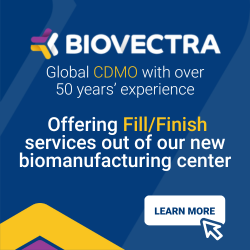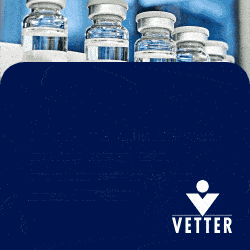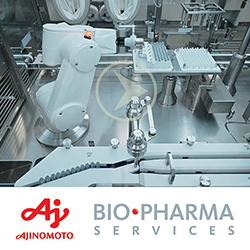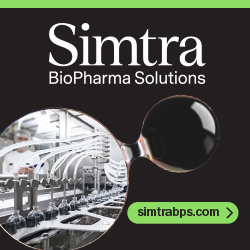2/20/2013
Argos Therapeutics Announces Updated Phase II Data
Argos Therapeutics Inc. recently announced updated results from its Phase II study of AGS-003, its most advanced product candidate for the treatment of metastatic renal cell carcinoma (mRCC). The results, which were presented by Dr. Asim Amin of the Levine Cancer Institute during a poster session on Saturday February 16, at the 2013 ASCO Genitourinary Cancers Symposium in Orlando, continue to show prolonged survival in patients with unfavorable risk mRCC, with one-third of patients still alive after nearly 4 years or longer.
“The prolonged survival of patients in our Phase II study is striking and directly correlates to the immune responses generated by AGS-003,” said Jeff Abbey, Chief Executive Officer of Argos Therapeutics. “The combination of AGS-003 plus sunitinib doubled the expected overall survival for the unfavorable risk advanced kidney cancer patients enrolled in the study, and one-third of the patients remain alive after nearly 4 years or longer. We are confident these encouraging clinical and immunological responses will be further validated in our ongoing pivotal Phase III ADAPT study.”
The open label Phase II study followed 21 patients with unfavorable risk mRCC, with an expected survival of approximately 15 months. Treatment consisted of standard 6-week cycles of sunitinib plus AGS-003, which was administered every 3 weeks for 5 doses, and then every 12 weeks until progression.
As previously reported, the final median overall survival was 30.2 months. When analyzed by baseline Heng risk status, the median overall survival for intermediate risk patients (n=11) has not been reached, but is estimated to be longer than 39.5 months with continued follow-up. Median overall survival for poor risk patients (n=10) was 9.1 months. Of the 21 patients who participated in the study, 7 (33%) patients are still alive after nearly 4 years or longer following study registration.
Argos Therapeutics is currently enrolling patients in the ADAPT Phase III clinical study for AGS-003. The ADAPT study is a randomized, multicenter, open-label clinical trial and is expected to enroll 450 patients in approximately 120 global sites, mostly in North America. The study is designed to examine the potential for AGS-003 plus standard targeted drug therapy to extend overall survival versus standard therapy alone in newly diagnosed patients with unfavorable risk mRCC. Secondary endpoints include progression-free survival, safety, overall response, and immune response.
Arcelis is a fully personalized, active immunotherapy technology that captures all antigens, including mutated and variant antigens that are specific to each patient’s disease. It has been shown to overcome immunosuppression by producing a durable memory T-cell response without adjuvants that are associated with toxicity. The technology can be leveraged to manufacture personalized therapies for any cancer or infectious disease.
The Arcelis process integrates readily into many current treatment paradigms, using only a small tumor or blood sample and the patient’s own dendritic cells, which are derived and optimized following a single leukapheresis procedure. The proprietary process uses RNA isolated from the patient sample to program the dendritic cells to target the entire disease-antigen repertoire. The activated, antigen-loaded dendritic cells are then formulated into the patient’s plasma and administered as an intradermal injection to produce the desired patient-specific immune response.
Arcelis technology also overcomes many of the manufacturing and commercialization challenges that have impeded other personalized cancer immunotherapies. Automated processes allow a single facility to serve all of North America and can be used to treat any cancer or infectious disease with the same manufacturing process and equipment.
Argos Therapeutics is a biopharmaceutical company focused on the development and commercialization of fully personalized immunotherapies for the treatment of cancer and infectious diseases using its Arcelis technology platform. For more information about AGS-003 and the ADAPT study, visit www.ADAPTkidneycancer.com, or follow us Argos Therapeutics on Twitter @ADAPTkdnycancer. For more information about Argos Therapeutics, visit www.argostherapeutics.com.
Biosimilars Market Expected to Soar
Top representatives from the healthcare industry were confirmed to attend the 2nd Biosimilars Congregation which took place in London on February 19 and 20. Ranjith Gopinathan, Frost & Sullivan Program Manager for Life Sciences, Europe Practice participated on the event’s Keynote Panel Discussion focusing on challenges and opportunities in the global biosimilars market.
“Experience in biosimilars development, manufacturing, and commercialization in regulated markets, such as Europe and the US, is limited. Furthermore, reluctance from some physicians and patients to adopt biosimilars due to perceived efficacy and safety issues could have an adverse impact on market penetration. Such uncertainties, in addition to the complex regulatory pathway, compound the risks for biosimilars manufacturers,“ said Gopinathan
Initially, manufacturers of biosimilars will focus on the three protein classes of erythropoiein and human growth hormone due to their recent patent expiry. In the long run, insulin, interferon, and more complex proteins like monoclonal antibodies are likely to emerge. However, some companies may concentrate on certain therapeutic classes depending on their capabilities and strategic fit.
Europe has the highest number of biosimilars approvals in the regulated market and will continue to increase in the near future. Further patent expiries of biologics will likely increase the number of approved biosimilars and players in the market and thereby will bring in a greater number of products that will increase the market size. Biosimilars are currently priced at about 20% to 30% below the original product price.
The 2nd Biosimilars Congregation 2013, which is organized by Virtue Insight, brought together top pharmaceutical, biotechnology, and regulatory representatives under one roof, who addressed the industry key issues ranging from the evolving regulatory landscape and challenges in clinical development to the legal and economic aspects.
Frost & Sullivan, the Growth Partnership Company, works in collaboration with clients to leverage visionary innovation that addresses the global challenges and related growth opportunities that will make or break today’s market participants. For more than 50 years, it has been developing growth strategies for the global 1000, emerging businesses, the public sector, and the investment community. Is your organization prepared for the next profound wave of industry convergence, disruptive technologies, increasing competitive intensity, Mega Trends, breakthrough best practices, changing customer dynamics and emerging economies? Contact us: Start the discussion.
93% Shares of OctoPlus Acquired
Dr Reddy’s Laboratories (DRL), which is in the process of acquiring Netherlands-based speciality pharmaceutical company OctoPlus NV for about 27.4 million euro, has so far managed to get nearly 93% shares of the firm in its favor.
“During the offer period, which ended at 1800 hours CET on February 8, 2013 (the Closing Date), 37,233,244 shares, representing 70.7% of the shares and a value of 19,361,286.88 euro, have been tendered for acceptance under the offer,” DRL officials released in a statement. “The 11,575,394 shares held by the offeror at 1800 hours CET on the Closing Date, together with the shares tendered under the offer, represent a total of 92.7% of the shares. This percentage exceeds the acceptance threshold of 92.5% of OctoPlus’ aggregate issued and outstanding share capital.”
DRL officials further announced the commencement of a Post Closing Acceptance Period from February 13-26 to enable the shareholders who did not tender their shares during the offer period to sell shares.
On October 22, the drug major announced that it has decided to acquire OctoPlus NV for about 27.4 million euros. The transaction is expected to be completed by the end of the current financial year, GV Prasad Vice Chairman and Chief Executive Officer, DRL had said earlier. As per the agreement, DRL made an open offer to purchase all outstanding shares of OctoPlus at an offer price of 0.52 euro in cash for each share. The extraordinary general meeting of OctoPlus held last month approved the appointment of GV Prasad and R Ananthanarayana to the Supervisory Board of the Netherlands- based pharma company.
DRL officials indicated it intends to acquire all shares in the company, and in order to achieve this, the Indian drug maker aims to increase its interest in OctoPlus to a level that allows it to initiate a takeover squeeze-out procedure in accordance with Dutch Civil laws.
Opioid Drug Abuse Will be Tackled Through New Delivery Methods
The opioid pain management market will continue to evolve throughout the coming years with new products and post-marketing studies that aim to reduce the risk of abuse, states a new report by healthcare experts GBI Research.
The new report explores the future of abuse-resistant formulations, which have become a vital feature in today’s healthcare environment, due to the fact that patients experiencing moderate or severe pain are treated almost exclusively with opioid analgesics. GBI Research notes that in the US, Germany, the UK, France, Italy, Spain, and Japan, 352 opioid-based products are currently approved to treat a range of painful conditions, based upon 16 different opioid compounds.
However, while both the FDA and European Medicines Agency (EMA) set strict regulatory requirements for marketed opioid analgesics, physician associations have also become more vocal about raising public awareness of opioid abuse. Physicians are forced to exercise a high degree of caution when prescribing opioid medications, and for this reason, the prescription volume of opioids in the US may eventually reach a plateau.
In order to tackle this problem, many companies are working to develop abuse-resistant formulations of Extended-Release (ER) opioid analgesics. Embeda (morphine sulfate and naltrexone hydrochloride), launched in the US in 2009 as the first opioid product designed to be abuse-resistant, and a whole range of abuse-resistant reformulations of existing products have now hit the market.
Rigorous regulations are in place to control the opioid drug market, and, in the US, almost every marketing approval for an ER opioid launched recently has been accompanied by a Risk Evaluation and Mitigation Strategy (REMS), which demands that license holders provide physician training and raise patient awareness regarding the risks of opioid abuse. Many orally administered ER products also require post-marketing studies to examine the efficacy of abuse-resistant formulations.
For instance, post-marketing data for Embeda has so far has shown the drug has a safety profile comparable to the standard ER morphine formulation, and a possible degree of abuse resistance. Though it will take several years yet for a substantial amount of post-marketing data to be collected and analyzed, Embeda’s initial reports are a positive beginning in the effort to curb opioid abuse.
Orally administered ER opioids remain the dominant product formulation at present, but transdermal patch products may represent a future market hit. Although their current high pricing and analgesic effects are a deterrent for some physicians, their ease of application, long-lasting analgesic effects, and inherent protection against abuse may yet see the alternate administration method take over the pain relief market in the coming years.
This report provides an overview of the current opioid product market, profiles of the most important opioid products, pipeline analysis of the opioid products currently in development, and an overview of M&A and licensing deals and co-development deals, across multiple indications. This report was built using data and information sourced from proprietary databases, primary and secondary research, and in-house analysis conducted by GBI Research’s team of industry experts. For more information, please contact the Press Office on +44 (0)1204 543 528 or at pr@gbiresearch.com.
Nexavar Continues to Dominate Advanced Liver Cancer Therapy
Hepatocellular carcinoma (HCC), the most common form of liver cancer, carries a deadly reputation, and patients face shrinking hopes of new treatment options as drug trials hit problems, according to a new report by healthcare experts.
The new report states that HCC suffers a poor diagnosis rate, due to the disease’s symptoms tending to only emerge in the advanced stages of the disease. Disease awareness is also low due to a lack of public and professional understanding, with no mandatory screening guidelines even existing for HCC diagnosis. HCC treatment depends upon tumor size and location, and patient health, but around 75% of HCC patients are declared ineligible for curative surgical treatment due to poor liver function or advanced disease, and so alternate treatment options, such as chemotherapy, ablation, and radiation therapy, are vital.
Nexavar (sorafenib) is the only therapy currently approved to treat HCC in Europe and the US, and represents a new class of drugs that aim to improve upon standard chemotherapy drugs by specifically targeting cancer cells or their surrounding environment, while leaving normal cells unaffected, causing less damage to the patient. Nexavar works by hindering new blood vessel growth, thereby slowing tumor growth. Prior to Nexavar’s approval, various off-label chemotherapeutic agents were used as therapeutics, despite low effectiveness.
The HCC pipeline contains 80 molecules in total, as companies look to tap the virtually untouched HCC treatment market. However, most molecules are in early phases of development, years away from approval. Phase III contains molecules, which may soon influence the competitive landscape, including Celsion’s ThermoDox, ImClone/Eli Lilly’s ramucirumab, Medigen/Progen’s muparfostat and Novartis’ Afinitor (everolimus), but late-stage trials are also suffering setbacks. Bristol-Myers Squibb’s (BMS’) promising molecule brivanib was declared ineffective in meeting its primary endpoint following recent late-stage clinical trials, and Pfizer recently discontinued a Phase III study of Sutent (sunitinib malate) as it failed to prove superior to Nexavar, and caused serious adverse effects.
Virus JX-594, originally used to make the smallpox vaccine, may represent the newest approach to the fight against cancer, as alterations have caused the virus to infect cancer cells, by causing them to die or make proteins that lead to them being attacked by the body’s immune system. However, encouraging results in Phase I trials still leave a long road ahead for the treatment to reach the market.
The liver cancer therapeutics market in the top seven markets (the US, the UK, Germany, Italy, Japan, France, and Spain) grew at a Compound Annual Growth Rate (CAGR) of 21.7% during 2004-2011 to reach an estimated $374.3 million. In the coming years, the market is forecast to show a slower but steady climb at a CAGR of 8.1% to reach $644.3 million by 2018. Recent market growth has been driven by increasing annual costs of therapy, due to the approval of Nexavar in the US and Europe, and the anticipated launch of late-stage pipeline drugs is expected to continue this trend, with more advanced therapies demanding higher prices.
Third Rock Ventures Launches Cancer Immunotherapeutics Company With $47 Million
Third Rock Ventures, LLC recently announced the formation of Jounce Therapeutics, Inc. with a $47 million Series A financing of the company. Jounce is focused on the discovery and development of first-in-class cancer immunotherapies designed to harness the patient’s immune system to seek out and attack cancerous cells and tumors. This transformational approach, as compared to more traditional approaches of targeting the tumor directly, has the potential to drive durable responses to treatment, extending and improving patients’ quality of life for years. Jounce was founded by world leaders in the fields of immunobiology, cancer biology, and clinical and translational medicine.
“This is an exciting time as the promise of cancer immunotherapy is beginning to be realized. With key recent advances in cancer immunotherapy, we have gained invaluable insights into how the immune system recognizes tumors and a better understanding of effective cancer immunotherapy discovery and development,” said James P. Allison, PhD, Chair, The University of Texas MD Anderson Cancer Center Department of Immunology, whose research led to the clinical development of ipilimumab (Yervoy). “Jounce has brought together an expert team and powerful capabilities to discover and develop novel treatments that harness the power of the immune system, marking a significant step forward in the way we treat cancer.”
Jounce’s proprietary product engine enables the exploration of multiple mechanisms of action and a broad spectrum of targets. The company’s capabilities and expertise include tumor immunobiology, antibody discovery and optimization, and integrated translational science capabilities, including novel in vivo tumor model systems and other clinically based approaches. Jounce is leveraging these capabilities to build a robust pipeline of first-in-class biologic product candidates. The Series A financing enables the company to build its product engine and rapidly advance its lead programs to the clinic.
“Our goal at Third Rock Ventures is to launch and build companies that dramatically impact and improve patients’ lives. Cancer immunotherapies have shown the potential to not just incrementally enhance patients’ quality of life, but to significantly improve their long-term survival,” said Cary Pfeffer, MD, interim Chief Executive Officer of Jounce and Partner at Third Rock Ventures. “Jounce has assembled a world-leading team that is at the forefront of the new understanding of the power and potential of cancer immunotherapies. We are uniquely positioned to rapidly develop our pipeline and, ultimately, deliver on our goal of improving patients’ lives.”
Cancer immunotherapy is the use of the body’s immune system to reject or attack cancerous cells and tumors. Cancer immunotherapy is not a new approach; it was first explored more than 100 years ago when, on a rare occasion, cancer patients who contracted infections after surgery appeared to fare better, probably due to the more activated state of their immune system. Cancer immunotherapy has made enormous strides forward in the past decade. Recent approvals and successful clinical trials of cancer immunotherapy treatments have built momentum in the space, improved knowledge about how the immune system recognizes and attacks tumors, and led to a better understanding of effective trial design for these therapies. Cancer immunotherapies have shown the potential to not just incrementally improve patient’s survival, but to significantly impact long-term survival and quality of life.
Jounce Therapeutics is dedicated to transforming the treatment of cancer. The company is discovering and developing first-in-class cancer immunotherapies designed to harness the immune system to seek out and attack cancerous cells and tumors. Jounce’s proprietary product engine is driving this transformational approach, which has the potential to drive significantly more durable responses to treatment, extending and improving patients’ quality of life. Founded by world leaders in immunobiology, cancer biology, and clinical and translational medicine, Jounce Therapeutics was launched in 2013 with funding from leading life sciences investor, Third Rock Ventures. For more information, please visit www.jouncetx.com.
Third Rock Ventures is a venture capital firm founded in 2007 with the mission to launch transformative life sciences companies. With more than $800 million and two funds under management, the firm is focused on working with passionate entrepreneurs to build exceptional companies working in areas of disruptive science that will make a difference in the lives of patients. For more information, visit www.thirdrockventures.com.
Total Page Views: 1017

















